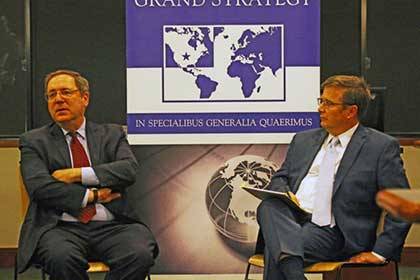
The Iran nuclear deal is flawed, but stepping away from the deal would be even worse, David E. Sanger, chief Washington correspondent of The New York Times said Thursday in a talk at the Sanford School of Public Policy.
“The agreement does not last long enough,” Sanger said. “The fact of the matter is, in year fifteen, they can basically produce as much as they want. Then, they’ll have new leadership, and then situation will look entirely different.”
Read MoreThe conversation between Sanger and moderator Peter Feaver, professor of political science and public policy, delved into past policy of the Bush administration, current foreign policy of the Obama administration and how the administration’s decisions will affect future political conditions, with particular attention to the Iran nuclear deal, cyberwarfare and the Middle East.
The discussion,“An Obama Scorecard: Cyber, Nuclear Proliferation and Geopolitical Instability,” was sponsored by the Political Science department, the DeWitt Wallace Center for Media and Democracy, and the Duke University Program in American Grand Strategy.
Sanger said the Iran nuclear deal was not established through isolation and economic sanctions alone.
“What worked in the end were some forces at work in Iran that the administration had no control over that brought about the election of President Rouhani and in the appointment of Javad Zarif, the foreign minister, as his lead negotiator. The second thing that worked was coercion,” Sanger stated.
And while the deal is too-short-lived, Republican candidates’ proposals to completely retract the deal, are ill-advised, Sanger said,
“And then what?” Sanger said. “If we walk away from the deal, the Iranians no longer have the limits on how much they can produce, and frankly, this deal, as imperfect as it is, buys you more time than if you bomb them.”
Sanger and Feaver also discussed relations between the United States and the Middle East.
“When you think across the globe, it’s weak states that have caused us much more trouble than strong states,” Sanger said. “It’s the Libyas of the world, where we fail to put in any ground presence because we don’t want to get sucked in, and now we’re dealing with a fracturing state that’s becoming a home to ISIS.
“We’re all busy trying not to make our predecessor’s mistake, or our last mistake, and I think there’s a reason to argue that President Obama may have overlearned some lessons of the Bush years.”